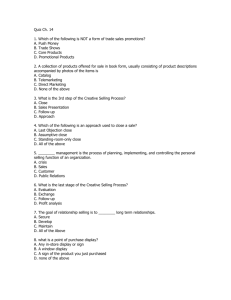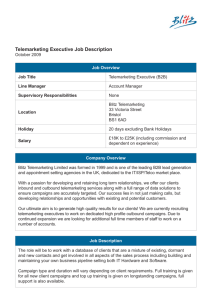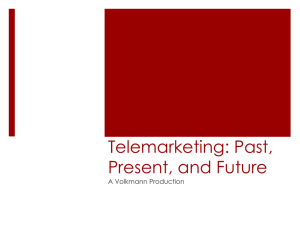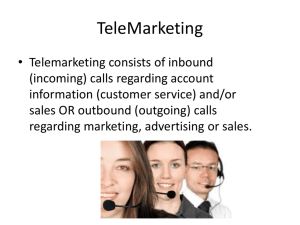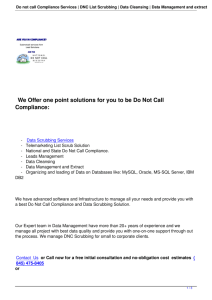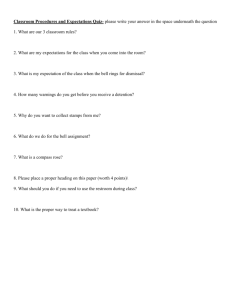Do Not Call Service from Bell Questions & Answers
advertisement
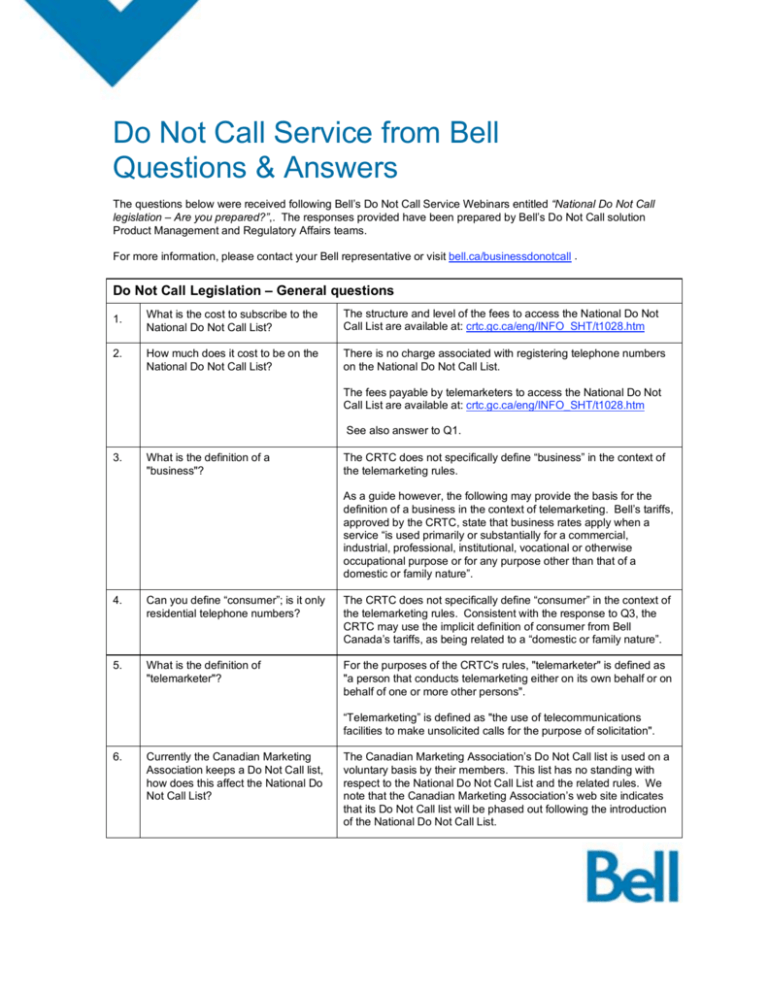
Do Not Call Service from Bell Questions & Answers The questions below were received following Bell’s Do Not Call Service Webinars entitled “National Do Not Call legislation – Are you prepared?”,. The responses provided have been prepared by Bell’s Do Not Call solution Product Management and Regulatory Affairs teams. For more information, please contact your Bell representative or visit bell.ca/businessdonotcall . Do Not Call Legislation – General questions 1. What is the cost to subscribe to the National Do Not Call List? The structure and level of the fees to access the National Do Not Call List are available at: crtc.gc.ca/eng/INFO_SHT/t1028.htm 2. How much does it cost to be on the National Do Not Call List? There is no charge associated with registering telephone numbers on the National Do Not Call List. The fees payable by telemarketers to access the National Do Not Call List are available at: crtc.gc.ca/eng/INFO_SHT/t1028.htm See also answer to Q1. 3. What is the definition of a "business"? The CRTC does not specifically define “business” in the context of the telemarketing rules. As a guide however, the following may provide the basis for the definition of a business in the context of telemarketing. Bell’s tariffs, approved by the CRTC, state that business rates apply when a service “is used primarily or substantially for a commercial, industrial, professional, institutional, vocational or otherwise occupational purpose or for any purpose other than that of a domestic or family nature”. 4. Can you define “consumer”; is it only residential telephone numbers? The CRTC does not specifically define “consumer” in the context of the telemarketing rules. Consistent with the response to Q3, the CRTC may use the implicit definition of consumer from Bell Canada’s tariffs, as being related to a “domestic or family nature”. 5. What is the definition of "telemarketer"? For the purposes of the CRTC's rules, "telemarketer" is defined as "a person that conducts telemarketing either on its own behalf or on behalf of one or more other persons". “Telemarketing” is defined as "the use of telecommunications facilities to make unsolicited calls for the purpose of solicitation". 6. Currently the Canadian Marketing Association keeps a Do Not Call list, how does this affect the National Do Not Call List? The Canadian Marketing Association’s Do Not Call list is used on a voluntary basis by their members. This list has no standing with respect to the National Do Not Call List and the related rules. We note that the Canadian Marketing Association’s web site indicates that its Do Not Call list will be phased out following the introduction of the National Do Not Call List. 7. At a CRTC session, I was told that when the US system was launched, the operators received over 90,000 complaints per month, 15% of which were unfounded. How will Bell help promote the exemptions to new registrants to avoid confusion? The CRTC has conducted an extensive public awareness program prior to the launch of the National Do Not Call List. We feel that one of the objectives of this program was to ensure the public understands the exemptions. 8. What tools are available to end users? To register a complaint about a telemarketing call, the consumer will be asked to provide their telephone number, the name and/or telephone number of the telemarketer, the date and time of the offending call, along with the nature of the complaint. In the case of complaints about fax messages, a copy of the offending fax message should also be provided. It is not necessary for consumers to provide a recording or any form of proof of a call in order to register a complaint. 9. Can a business clean their internal lists by downloading a current copy of the National Do Not Call List? Do they have to use an automated service? Yes, telemarketers are able to download all or a portion of the National Do Not Call List to use in scrubbing their calling lists. Bell will provide information in its telephone directories and on its website (www.bell.ca) with respect to the National Do Not Call List, including a description of the exemptions. In addition, in its role as the operator of the National Do Not Call List on behalf of the CRTC, Bell will make such information available to consumers who register their numbers online on the National Do Not Call List. Alternatively, business customers can subscribe to Bell’s suite of Do Not Call services and utilize a solution that is warranted against costly penalties associated with violating the National Do Not Call List legislation.* o Call Search - Certifies numbers on demand from a hosted database, which is unique and proprietary to your business. Call Search checks numbers against all applicable restrictions and instantly returns results to the desktop. o Call Advisor – Automatically checks every telemarketing dial attempt against all Do Not Call List restrictions, including federal, provincial and internal lists. o Guardian - A high-powered, hosted application designed for today’s high volume call centres that use automated dialing devices. Guardian delivers full searching, certification and modification functionalities with multiple campaign capability. o Exemption Advisor - A customer contact tool that automates exemption management to create new customer calling opportunities. Telephone numbers are certified and calls are routed in cases where exemption rules allow, and blocked where disallowed. For more information about Bell’s suite of Do Not Call solutions, please contact your Bell Representative or visit bell.ca/businessdonotcall to request a call back. *Warranty provided by Gryphon Networks Corp. to Bell customers. Subject to customer compliance with Bell’s Do Not Call Contract Service Schedule. 10. How do we obtain a listing of companies on the National Do Not Call List? Telemarketers are able to download all or a portion of the National Do Not Call List, or to validate specific numbers against the National Do Not Call List via a query/response mechanism. 11. The presentation refers to Provincial lists. Is there to be one National Do Not Call List only? My understanding was that we wouldn't have the US complications of duplicate State and Federal regulation. There are no Provincial Do Not Call lists at this time. However, some provinces have legislation that applies to telemarketers, including calling hour restrictions that vary from the CRTC’s rules. 12. Does the National Do Not Call legislation cover cell phone numbers as well? Consumers can register any valid telephone number on the National Do Not Call List, including cellular numbers. 13. If subscribing to Bell’s suite of Do Not Call solutions, is Bell then ultimately responsible for ensuring the "list" is up to date? Ultimately the CRTC owns the National Do Not Call List however, as the National Do Not Call List operator, Bell is responsible for ensuring that the Do Not Call List is up to date. Individual telemarketers using the list, including those who use one of Bell’s suite of Do Not Call services, are responsible for ensuring that they are using a version of the National Do Not Call List that is no more than 30 days old, in order to avoid possibly contacting numbers that are validly registered on the National Do Not Call List, in violation of the legislation. 14. What is the recourse for the accused company that has been found in breach of the Do Not Call legislation? Company’s that have been found in breach of the Do Not Call legislation must provide their own defense. A customer using their own internally built Do Not Call solution will need to provide their own defense to justify the calling of the consumer who has lodged the complaint. It should be noted however that Bell offers a suite of Do Not Call services that are warranted against costly penalties associated with violating the National Do Not Call List legislation.* *Warranty provided by Gryphon Networks Corp. to Bell customers. Subject to customer compliance with Bell’s Do Not Call Contract Service Schedule. 15. How can the consumer prove they received an unwanted call when they are on the National Do Not Call List? Consumers will not be required to prove the receipt of an unwanted call to a number that they have registered on the National Do Not Call List. However, when registering a complaint about a telemarketing call, consumers will be asked to provide details about the call, such as date and time as well as information to identify the calling party. 16. Does the Do Not Call legislation refer to telemarketing businesses only and their customers? The rules associated with the Do Not Call legislation apply, to varying degrees, to businesses that (a) place telemarketing calls on their own behalf, (b) place telemarketing calls on behalf of clients and (c) are clients of telemarketers. 17. Are there any implications for nonCanadian telemarketers? The CRTC’s National Do Not Call List rules apply to telemarketing calls to Canadian consumers, regardless of point of origin. 18. Is it the responsibility of the "list provider" to have their phone list scrubbed against the National Do Not Call List or is the responsibility of scrubbing against the National Do Not Call List part of the "telemarketers" responsibility? The onus is on telemarketers and customers of telemarketers to comply with the National Do Not Call List. In the event of a violation of the associated rules, the telemarketer and/or its customer would be liable for any penalty applied by the CRTC. 19. Do the National Do Not Call List rules apply to customer contact centres? Specifically to calls that reply to voice messages left in our Customer Service mailbox. The telemarketing rules apply to outbound telemarketing calls; incoming calls from customers are not affected by these rules. 20. How can we know if we should be putting our company on the list if we don’t do any telemarketing? The CRTC’s telemarketing rules, including the National Do Not Call List regime, do not affect organizations that do not conduct telemarketing or that do not hire telemarketing services to complete calls on their behalf. 21. Does the National Do Not Call List also include email and/or fax communications? The rules apply to telemarketing calls to standard telephone numbers. Thus, the rules apply to voice and fax calls, but not to email messages. 22. Where can I find the text of the legislation in English and French? The text of the legislation is available in both official languages at the CRTC web site: lnnte-dncl.gc.ca/ . 23. If I call a past customer to get repeat business is this considered telemarketing? Any unsolicited call for the purpose of promoting or selling a product or service would be considered telemarketing. 24. During the webinar, you indicated that both the customer and the telemarketer must register to the National DNCL. I understood the rules to state that both don’t have to register; just one of them must. Can you please clarify? If the answer is both have to register, what specific CRTC telemarketing rule is being referenced? Entities that place telemarketing calls on their own behalf, or who engage others to place such calls on their behalf, must register. As a result, telemarketing agencies who only place calls on behalf of customers need not register. Conversely, agencies who also place calls on their own behalf would be required to register. See rules #2 and #3 of the CRTC’s Telemarketing Rules. 25. As a realtor, do I have to subscribe to and pay fees required for the National Do Not Call List? The legislation and associated rules do not accord special treatment for realtors. Thus, realtors who place telemarketing calls will need to register and, if applicable, subscribe to the National Do Not Call List. The Existing Business Relationship exemption to the National Do Not Call List rules allows organizations to place telemarketing calls to consumers who are on the National Do Not Call List when that consumer has made “an inquiry or application, within the six-month period immediately preceding the date of the telecommunication, by the person to whom the telecommunication is made in respect of a product or service offered by the person or organization on whose behalf the telecommunication is made.” Moreover, a call in response to a consumer’s voice message may not involve telemarketing, depending on the nature of the communication involved. 26. In the presentation, charities are included in the definition of telemarketing however they are also listed as being exempt. Isn’t this contradictory? Calls that solicit donations on behalf of registered charities are considered to be telemarketing calls however by virtue of the exemption; such calls may be placed to telephone numbers regardless of whether they are registered on the National Do Not Call List. Nevertheless, calls on behalf of registered charities must comply with the other rules that govern telemarketing, such as calling hour restrictions and the requirement to maintain an Internal Do Not Call List. 27. If a consumer is on the National Do Not Call List then moves and changes their telephone number, what are the repercussions? When a consumer, whose number is registered on the National Do Not Call List, moves and changes their telephone number, the onus is on the consumer to register the new number if they wish to continue to be on the National Do Not Call List. 28. When a consumer is on the National Do Not Call List and a business accidentally calls them, does the business have to give them their name? The requirement to properly identify yourself applies at the outset of all telemarketing calls. Thus, in most instances, the caller identification will have taken place before the caller would be aware that the call may be a violation of the National Do Not Call List rules. 29. If the CRTC receives a complaint that is subsequently upheld, who will be fined…the individual making the call, the company they work for or both? At this point in time, we do not know how the CRTC will apply financial penalties for violations of the telemarketing rules. However, we expect that the CRTC would be unlikely to impose financial penalties on individual employees whose calls on behalf of an employer are in violation of the Telemarketing Rules. 30. How often is the National Do Not Call List updated? The National Do Not Call List is updated with new registrations continuously. The 31-day grace period for respecting new consumer registrations on the list means that telemarketers must always use a version of the National Do Not Call List that is no more than one month old. 31. What happens when a consumer that has registered their telephone number on the National Do Not Call List changes their telephone number however does not remove the old telephone number from the National Do Not Call List? Registrations on the National Do Not Call List remain in effect for 3 years and 31 days from the date of registration. After that time, the registered number is removed from the National Do Not Call List. In establishing this process, the CRTC attempted to strike a balance between consumer convenience and the additional costs that would be involved in establishing a process to remove telephone numbers that are no longer in use. 32. Will the National Do Not Call legislation prevent telemarketers from calling consumers for the purpose of solicitation? Telemarketing continues to be generally allowed. A consumer who registers on the National Do Not Call List should experience a reduction in the number of telemarketing calls received however, in light of the exemptions to the use of the list, a number of organizations will still be permitted to place telemarketing calls to that consumer. 33. Does the National Do Not Call legislation mean that businesses cannot make cold calls to consumers? Cold calls are still permitted however what has changed is that, if your calls are not subject to one of the exemptions, you must check your calling list against the National Do Not Call List to ensure that you do not place cold calls to numbers that are registered on the National Do Not Call List. 34. The National Do Not Call legislation seems to be consumer oriented. Although some estheticians operate out of their home, for the most part their customers are beauty salons and spas. Do they need to be concerned about the legislation if they do not contact consumers? This legislation and the associated CRTC rules relate to telemarketing, as defined in the presentation material. If your organization conducts telemarketing calls, you need to be concerned with complying with these rules. Further, to the extent that you place telemarketing calls that are not subject to one of the exemptions, you need to use the National Do Not Call List to scrub your calling list. In that case, Bell’s suite of Do Not Call services may be of value to your business. Internal Do Not Call Lists: 35. If a customer writes in to ask a business to put them on their company’s Do Not Call list do they have to call the customer back to confirm this was done? There is no obligation for companies to confirm with customers that their names and numbers have been placed on the company’s individual Do Not Call list. 36. As a third party provider, if a customer asks to be put on our Internal Do Not Call list, does it get put on the National Do Not Call List for all of our clients? The CRTC rules state that “a telemarketer initiating a telemarketing telecommunication on behalf of a client shall make all reasonable efforts to ensure that the client adds a consumer’s name and telecommunications number to the client’s Do Not Call list within thirty-one (31) days of the consumer’s do not call request.” Such Do Not Call requests do not apply to calls that the telemarketer makes on behalf of other clients. 37. If a customer is not on the National Do Not Call List but has verbally said to us, for example, that he doesn’t want us to call him for his vehicle maintenance but we do anyway, can he file a complaint just the same and could we be fined? All organizations that conduct telemarketing on their own behalf (or that hire telemarketers to call for them) must maintain an individual Do Not Call list. Customer requests to be on an organization’s individual list override any exemption to the National Do Not Call List rules that would otherwise apply. One of our customers is an Automotive Dealer. Does Bell have a way to help them manage their internal Do Not Call list? All organizations that conduct telemarketing on their own behalf (or that hire telemarketers to call for them) must maintain an individual Do Not Call list. Customer requests to be on an organization’s individual list override any exemption to the National Do Not Call List rules that would otherwise apply. 38. Also see Q36 and Q16. Bell’s suite of Do Not Call services enable customers to manage their own internal Do Not Call lists – to add or remove numbers as required in real time to ensure compliance. 39. I understand that we must also maintain our own internal Do Not Call list. If a consumer asks us to not call them, would this request extend to our corporate affiliates? I would imagine it would not since an existing business relationship does not extend to corporate affiliates. Internal Do Not Call requests received during the course of a telemarketing call would generally be applicable to the entity on whose behalf the call is being made. So if the call is on behalf of a single corporate entity, such a request would normally be applicable to that entity and not to its affiliates. However, we would encourage the application of some judgment in such instances; considerations such as the customer’s reasonable expectations in the circumstances (e.g. would the consumer appreciate the distinction between the corporate affiliates in question?) should also be weighed in assessing how such requests should be treated for internal DNC purposes. 40. I run a Montessori daycare and I receive calls on a regular weekly basis from telemarketers which is disrupting. Can you tell me when will the National Do Not Call List be available to me and if not what I can do? You can register your telephone number on the National Do Not Call List now however you will probably still receive some telemarketing calls as a result of the exemptions to the National Do Not Call List. When you receive such calls, you can ask that your telephone number be placed on the caller’s internal Do Not Call list. After the 31-day grace period associated with the Do Not Call registrations, any further telemarketing calls that are subject to your Do Not Call requests would represent violations of the CRTC’s rules, which you can report to the CRTC by registering a complaint against the originators of such calls, at dncl.gc.ca 41. Why does Bell not have an automatic block on a Do Not Call number that stops telemarketers from being able to connect? This would stop all confusion of who to call and who is registered. The National Do Not Call List rules do not prohibit all telemarketing calls to numbers that are registered on the list; Parliament has determined that it is appropriate that a number of different types of organizations be allowed to place telemarketing calls to such numbers. Accordingly, such an automatic block service would not be appropriate. 42. Does the National Do Not Call List legislation impact Ad-Mail or Webmail? This legislation and the associated CRTC rules relate specifically to telemarketing. Other forms of direct marketing are unaffected. 43. Is there a 31 day grace period for telemarketer’s Internal Do Not Call List? Telemarketers must respect consumer requests to be placed on their internal Do Not Call List within 31 days. 44. As an independent broker in an insurance agency, can the agency register all brokers as telemarketers on behalf of the agency and provide a central service of a merged general Do Not Call list together with the internal list to all brokers? The answer to this question depends on the precise nature of the relationship between the agency and its brokers. We recommend that you consult with the CRTC to assess how the rules would apply in the context of your specific situation. Exemption Lists 45. What would be the implications of the Do Not Call legislation if a business wishes to limit its telemarketing only to existing businesses? Telemarketing calls to consumers with whom a business has an existing business relationship are exempt from the National Do Not Call List. Telemarketing calls to business numbers are also exempt. Accordingly, businesses who only make such calls need not subscribe to the National Do Not Call List. However, the telemarketing rules require that all telemarketers maintain individual Do Not Call list to address specific customer requests not to be called. 46. Can an organization, specifically a Municipality, add themselves to the National Do Not Call List? If so, and if multiple numbers are available in a hunting pool, how would an organization register their number(s)? It is understandable that any participation in the list will be elective. Businesses or government entities can register their telephone numbers on the National Do Not Call List. Each of the entity’s telephone numbers would have to be registered individually. However, the National Do Not Call List rules do not apply to telemarketing calls to businesses. 47. If a company decides to go on the National Do Not Call List does this mean that suppliers cannot contact them if they haven't done business with them in the past? The National Do Not Call List rules do not apply to calls made to businesses. Also see answer to Q46. 48. If a business or organization is exempt what do they have to comply to? All telemarketers are subject to the CRTC’s general telemarketing rules, regardless of the status of their calls with respect to the National Do Not Call List. See the Appendix to Telecom Decision CRTC 2008-6 for full details. crtc.gc.ca/eng/archive/2008/dt2008-6-1.htm 49. How does the National Do Not Call legislation affect business-to-business calls? Business-to-business calls are exempt from the National Do Not Call List rules. Also see answer to Q48. 50. We sometimes contact customers via phone in an attempt to collect money from customers whom we have had business relations with. They have used our service but may not currently have services with us: however they still owe money for past services. Can we call these customers? Telephone calls for the purposes of account collection are not deemed to be telemarketing and, hence, are not subject to the telemarketing and National Do Not Call List rules. 51. I currently receive response cards, what happens to all of the names we currently have? Do I still have 6 months since they responded to me? Response cards could be used to establish an “existing business relationship” and may also be an effective means of obtaining customer consent to be called, irrespective of registration on the National Do Not Call List. We recommend that you obtain independent advice as to whether your response cards would enable you to contact individuals who are on the National Do Not Call List. 52. It was mentioned that registered charities are exempt - does that mean they do not have to worry about the National Do Not Call List in any way and focus only on their internal "Do Not Call lists"? The Telecommunications Act states that the National Do Not Call List rules do not apply in respect of telemarketing calls made "by or on behalf of a registered charity within the meaning of subsection 248(1) of the Income Tax Act". However, all telemarketers are subject to the CRTC’s general telemarketing rules – including the requirement to maintain an internal Do Not Call list - regardless of their status with respect to the National Do Not Call List. See the Appendix to Telecom Decision CRTC 2008-6 for full details. crtc.gc.ca/eng/archive/2008/dt2008-6-1.htm 53. I am a Realtor, as such I subscribe to a Hotline service, where people call in and listen to various messages. If they do not leave a message I have a record of their telephone number. If that telephone number is on the National Do Not Call List can I still call since they originate the call by calling me first? The “existing business relationship” exemption to the National Do Not Call List applies to calls that follow up on “an inquiry or application, within the six-month period immediately preceding” the follow-up telemarketing call. We recommend that you obtain independent advice as to whether this exemption would be applicable to your specific situation. 54. If a company was to begin operating as a market research company but added a question for authorization to be able to have an affiliate contact them for a sales offer, is this legal and ok? Calls for the purposes of public opinion polls or market research surveys are exempt from the National Do Not Call List, as they do not constitute “telemarketing”. If such a call includes an element of solicitation, that exempt status could be jeopardized. At this point, we do not know how the CRTC would apply its rules to the type of scripting suggested in this question. 55. Are emergency calls exempted? For example, informing a citizen that his street will be closed for a period of time. Yes. Such calls would not fall within the definition of telemarketing. 56. If calls for selling Newspapers are exempt, what about calls from Real Estate? Parliament determined that calls to sell subscriptions to general circulation newspapers would be exempt from the National Do Not Call List. No such exemption was established for Real Estaterelated calls. 57. Is there an expectation that charities will not be exempt in the future? Bell is not aware of any plans to amend the legislation that created the National Do Not Call List exemption for registered charities. 58. Could you tell me if a follow up call to a prospective customer who has shown interest in a product is considered soliciting or not? Calls to prospective customers for the purposes of solicitation would be considered as telemarketing. However, for the purposes of the National Do Not Call List, the “existing business relationship” exemption would apply to calls that follow up on “an inquiry or application, within the six-month period immediately preceding” the follow-up telemarketing call. 59. If a telemarketer is calling business telephone numbers from the Dun And Bradstreet report does the National Do Not Call legislation apply to them or are they excluded because they are only calling business telephone numbers? The National Do Not Call List rules do not apply to calls made to a business. 60. Does a charity have the same exemptions as a non-profit organization? In other words, if a company donates all of it's after expense profits to a designated charity, does that exempt them from the National Do Not Call legislation? The Telecommunications Act states that the National Do Not Call List rules do not apply in respect of telemarketing calls made "by or on behalf of a registered charity within the meaning of subsection 248(1) of the Income Tax Act". There is no other exemption specifically related to non-profit organizations. 61. How will the National Do Not Call legislation affect non-profit organizations as they try to gain funding for their causes? Do they need to include an option for Do Not Call on their solicitation pieces? Sometimes non-profit organizations call their donors for new information on their address or credit cards (for monthly donors whose cards have expired). How will the National Do Not Call legislation affect them when these donors forget that they are already their donors? See response to Q60. 62. If a business receives a telephone number as a reference by an actual customer; can they call this person? The general rule is that telemarketers are not permitted to call consumers whose telephone numbers are on the National Do Not Call List without their express consent, unless one of the exemptions applies. There is no exemption that specifically relates to referrals. 63. If a customer bought a motor vehicle more than 18 months ago however it is still under warranty and still being financed, but they haven’t come in for maintenance but we nevertheless have to honour the warranty, is this still considered an Existing Business Relationship in terms of the National Do Not Call legislation? Can we contact them even if they are on the list to find out if they are having their maintenance done? The Existing Business Relationship exemption to the use of the National Do Not Call List also allows businesses to contact consumers when there is ‘any other written contract between the person to whom the telecommunication is made and the person or organization on whose behalf the telecommunication is made that is currently in existence or that expired within the eighteen-month period immediately preceding the date of the telecommunication.’ 64. If a customer did not purchase his vehicle from our company but came and had it repaired within the following 18 months, it’s considered an Existing Business Relationship; can I phone him to propose other promotions and products even if he is on the National Do Not Call List? The Existing Business Relationship exemption to the use of the National Do Not Call list allows businesses to contact customers who have purchased their products or services within the preceding 18 months. 65. If a consumer in on the National Do Not Call List however signs a consent with a business and has not requested that they stop calling, may the business continue to call or are they still required to check the telephone number against the National Do Not Call List? Telemarketers are not permitted to call consumers who are on the National Do Not Call List without the consumer’s express consent to be contacted via a telemarketing call, unless one of the exemptions applies. Thus, if you have evidence of a consumer’s express consent for you to place telemarketing calls to them; you may call that customer regardless of whether the consumer’s number is on the National Do Not Call List. See Part V of the CRTC’s rules for further information on acceptable forms of express consent. Non-profit organizations can take advantage of the same National Do Not Call List exemptions that are available to other telemarketers, such as the existing business relationship exemption. In addition, non-profit organizations could obtain express consent from their supporters to be called. Service calls, such as those to update client information, may also be exempt if they do not include any element of solicitation. In this situation, it appears that the written contract (i.e.: the warranty) may be sufficient to establish an Existing Business Relationship, that would allow telemarketing calls to the customer. We recommend that you obtain independent legal advice to guide your telemarketing plans for such situations. crtc.gc.ca/eng/archive/2007/dt2007-48.htm 66. If a business has an existing business relationship with a customer they are placing calls to confirm appointments, can these calls be made regardless of whether the customer is on the National Do Not Call List? Calls to confirm appointments should be acceptable regardless of a customer’s registration on the National Do Not Call List. Such calls would arguably not be telemarketing, since there is no element of solicitation in the call or, in any event, would be subject to the Existing Business Relationship exemption. Also see Q45. 67. We are a car dealership… Do the National Do Not Call List rules apply to us when we communicate with our customers? The rules generally apply to telemarketing calls, which are defined as unsolicited calls for the purposes of solicitation. Exemptions to the rules related to the National Do Not Call list have been established for businesses contacting their clients (see answer to Q66). Moreover, the rules do not apply to calls that do not involve telemarketing, such as calls for the purposes of account collection. 68. Can a charitable organization solicit new prospects by phone to raise funds or sell things? The Telecommunications Act states that the National Do Not Call List rules do not apply in respect of telemarketing calls made "by or on behalf of a registered charity within the meaning of subsection 248(1) of the Income Tax Act". However, all telemarketers are subject to the CRTC’s general telemarketing rules – including the requirement to maintain an internal Do Not Call list - regardless of their status with respect to the National Do Not Call List. See the Appendix to Telecom Decision CRTC 2008-6 for full details. crtc.gc.ca/eng/archive/2008/dt2008-6-1.htm 69. We traditionally sell to business customers exclusively however sometimes we are asked to contact or follow up on a lead which may not be business but rather an individual volunteer representing a community organization. Such calls may go directly to a non-business telephone number. Do we need to vet these types of contact against the National Do Not Call List? Exemptions from the National Do Not Call List are generally based on the purpose of the call. If your organization is in the business of marketing products or services that would be of interest only to other businesses, & your calling lists are reasonably thought to exclusively represent business numbers, your calls would be eligible for the business-to-business Do Not Call List exemption. However, the CRTC does not consider referrals should be eligible for an exemption from the National Do Not Call List. Accordingly, unless you have reason to believe that such referrals are business customers, there is a risk that the CRTC could find that calls to these referrals should be subject to the Do Not Call List restrictions. 70. Could you tell me a bit more about the exemption of business marketing to business customers? (i.e. faxing to business customers) Business to business telemarketing calls are not affected by the National Do Not Call List rules. However, such calls must comply with the other telemarketing rules established bye the CRTC, which include specific restrictions on fax telemarketing. See crtc.gc.ca/eng/INFO_SHT/t1030.htm for further details. 71. If a company calls a consumer to thank them for their business, is such a call exempt from the Do Not Call List rules? Calls that do not involve solicitation, such as “thank-you” calls, would not be considered telemarketing. Thus, none of the telemarketing restrictions, including the use of the National Do Not Call List, would apply. 72. Are calls from a doctor’s office impacted by the Do Not Call legislation? We believe that calls from a doctor’s office to former patients, for the purposes of “selling” the doctor’s services to such persons, would be considered by the CRTC to be telemarketing calls. Accordingly, such calls would be affected by these rules. That being said, from a National Do Not Call List perspective, these calls could be eligible for the “existing business relationship” exemption if they are placed to patients within 18 months of their last visit. 73. If someone has been a customer in the past, can we still call them regarding upcoming deals? Calls to customers with whom you have done business within the previous 18 months would be eligible for the “existing business relationship” exemption to the National Do Not Call legislation. However, you would still have to comply with the CRTC’s other telemarketing rules, including scrubbing your calling list against your internal Do Not Call list. Miscellaneous Questions: 74. We have a Mitel phone system...will we have to switch to Bell to have the Bell’s Do Not Call Call Advisor and Call Switch work for us? Bell’s suite of Do Not Call services are not dependant on a specific telephone system. 75. Was the Do Not Call Webinar archived? Yes. The links for the archived version of the Do Not Call Webinars are as follows: English : http://events.startcast.com/events/launch.asp?EventID=5458B58620DC-4870-985E-9CE8B97474C2 Français : http://events.startcast.com/events/launch.asp?EventID=3EF89DC 8-0CC7-488C-9FE8-0706A6FC344C 76. How many consumers have registered to be on the National Do Not Call List? Approximately 3 million numbers have been registered on the National Do Not Call List as of October 31, 2008. Bell’s Do Not Call Solution Questions: 77. Would Bell’s Call Search solution be an effective tool for a call center that does 100% cold calling? All of Bell’s Do Not Call services, including Call Search, are effective for cold calls and provide solutions that are warranted against costly penalties associated with violating the National Do Not Call List legislation.* A brief overview of Bell’s suite of Do Not Call services is as follows: o o o o Call Search - Certifies numbers on demand from a hosted database, which is unique and proprietary to your business. Call Search checks numbers against all applicable restrictions and instantly returns results to the desktop. Call Advisor – Automatically checks every telemarketing dial attempt against all Do Not Call restrictions, including federal, provincial and internal lists. Guardian - A high-powered, hosted application designed for today’s high volume call centres that use automated dialing devices. Guardian delivers full searching, certification and modification functionalities with multiple campaign capability Exemption Advisor - A customer contact tool that automates exemption management to create new customer calling opportunities. Telephone numbers are certified and calls are routed in cases where exemption rules allow, and blocked where disallowed. *Warranty provided by Gryphon Networks Corp. to Bell customers. Subject to customer compliance with Bell’s Do Not Call Contract Service Schedule. 78. How much does it cost to have access to Bell’s protection? Please contact your Bell representative or visit bell.ca/businessdonotcall for more information or to request a call back about Bell’s suite of Do Not Call services, including pricing information. 79. Is there a demo available for Bell’s suite of Do Not Call services? Bell’s suite of Do Not Call services are very user friendly and intuitive. If required, a customer demo can be arranged. 80. Can I use Call Search if I am using VoIP (Voice over IP)? Bell’s suite of Do Not Call services are not dependant on specific telephone lines (i.e. VoIP) or a specific telephone system. 81. If a company were to subscribe to Bell’s Do Not Call services, could they subscribe to 2 of the service offerings or is it necessary to subscribe to all 3 services? Bell’s suite of Do Not Call services are available as independent offerings or can be combined. Please contact your Bell representative or visit bell.ca/businessdonotcall for more information or to request a call back about Bell’s suite of Do Not Call services, including pricing information. 82. What telephone number is displayed when using Bell’s Call Advisor? The customer has the ability to specify what telephone number is to be displayed via the Call Advisor application. 83. We are a telemarketer located in New Brunswick and our telecom provider is Bell Aliant. Can we use Bell’s suite of Do Not Call services such as Call Advisor? There are limitations to the availability of Bell’s suite of Do Not Call services to customers in the eastern provinces. Please contact your Bell Aliant representative or visit bell.ca/businessdonotcall for more information or to request a call back about Bell’s suite of Do Not Call services, including pricing information.
